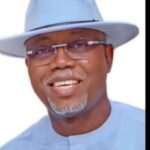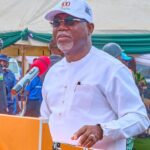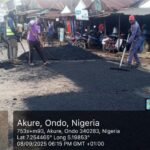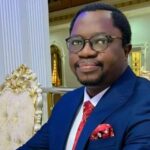Not many know that the Church of the Lord Aladura was established even earlier than the Cherubim and Seraphim (C&S), which clocks 100 this year. While C&S is celebrating its centenary this September, the Church of the Lord Aladura had already marked its 100th anniversary on May 17. A bigger celebration is being planned for November

The founder, Pa Josiah Ositelu, stood out among other leaders of white garment churches. Unlike most, he had theological training. As a catechist in the Anglican Church, he was well educated, wrote many of his sermons, and documented his ministry. According to his son, Dr. Rufus Ositelu, the current Primate of the church, he left the Anglican Church after being misunderstood for his spiritual experiences.
Another unique trait: Pa Ositelu did not leave with members from his former church when he received the call. He started alone. Over time, the Church of the Lord Aladura grew steadily and now has branches across the world. The church is known for its conservative stance and belongs to the Christian Council of Nigeria (CCN), an arm of CAN, rather than OAIC, where most white garment churches are grouped.
In this first part of a four-hour interview with Church Times and Asabe Africa TV, His Eminence sheds light on the church’s history and its relationship with other Aladura churches. They are the breakaway faction of the C&S and Celestial Church. Historically, we used to have the Nigerian Association of Aladura churches. That went into a coma. But it got to a time that the Cherubim and Seraphim Church approached me and said they would like to resuscitate NAC, and I said no, that are we have to start afresh because the foundation was bad and there is nothing we could build on it. The name I suggested was United Aladura Churches. Initially, the Corporate Affairs Commission turned down the name at the point of registration because it said its initials would clash with the United African Company. The CAC came up with the name, Conclave of Aladura Churches. But after many back and forth, they agreed on the name, United Aladura Churches.

Thank you for that clarification. But the reality on the ground is that many people know Prophet Moses Orimolade, who founded the C&S church, but only a few people know your dad, Pa Ositelu, who started Church of the Lord, Aladura. What was the relationship between your dad and Orimolade? Did they work together in their time?
No. They did not. The present leader of C and S Unification has been trying to educate the church because many people think every white garment church came out of C &S. I watched a clip on social media where a man was saying that the first white garment church in Nigeria was even started by a man from the South South called Garrick Braide, which is the truth. Before him, there was another person who came from Guinea who started what could be described as a white garment church in 1898.
But around the 1920s, when communication was quite poor and frustrating, God was raising Africans to start African-instituted churches all over the place. They did not know each other, but they were all being led to start churches in the 20s. My father, Pa Ositelu, was called by God on May 17, 1925. Prophet Orimolade was called on September 11 1925. As God would have it, the first Church established by an African in the UK was the Church of the Lord. It started in April 1964 in the UK. The C&S started its mission through Prophet Abidoye and Prophet Fakeye in the UK in June 1964 in UK. So, you see that everywhere, the Church of the Lord was the first.
Interestingly, an African went to establish a church in the UK as far back as 1964, when the whites were bringing the gospel to Africa. Was there a need for African missionaries in Europe at that time?

Yes. You are right that Africans took the gospel to Europe as far back as that time. Why this is strange is that at that time, the whole of the Global South, which is a term used to describe countries that were colonised and less developed, was seen as a mission field, while the Global North, which is a term used to describe developed countries, was expected to send missionaries to the Global South. But the truth now is that the world is a mission field. And many of the missionaries to the ends of the world are now from the Global South. The biggest churches in Europe at that time were started by Sunday Adelaja, where 25,000 people worship in a single place. That was before the war. The biggest church in the West of Europe at one point was Kingsway International Christian Centre by Pastor Mathew Ashimolo.
But what do you make of Paul Yonggi Cho’s church in South Korea?
The church used to be big, and I think they are still big. That one is not in Europe. It’s in East Asia. I remember they were supposed to host us in a forum called the Forum of Theological Educators, which has been rescheduled.
Let’s go back to our talk on Pa Ositelu and Orimolade. You said they started church at different dates in the same year. Did they meet at that time?
They never met physically until 1930. They only got to hear from each other. Some C&S members came to invite Baba Ositelu for a programme in a C&S church in Ijebu Ode when they heard God was using him. That was the first time Pa Ositelu would be with the C&S church.
But I must agree that C&S and Celestial churches are more popular than the Church of the Lord. The question is, why is this so? When trouble came for the C&S, I published a book which has a letter written by Moses Orimolade to Captain Abiodun, who was there at the beginning of the church, where he told her she could go with any member of the church she wanted to go with. That was the beginning of the schism within the church. Now there are over 500 splinter groups in C&S. Some of their scholars even say Moses Orimolade laid a curse on the church that they will never be united. They used to be five provinces of C&S, but when the crisis started, they all started going their way.
Now, how does that concern my father, Pa Ositelu? When God called him, he told him never to take any action without hearing from Him. In the course of his ministry, God told him the ministry would be in Lagos, but he did not tell him when, how or the people to go. Out of zeal, he went to Lagos. When he got there, some people who heard about him started gathering around him for prayers.
told Pa Ositelu to send one of his disciples to Lagos. That was Prophet Adejobi. The man from Oshogbo. He was the one who established the church in Lagos, and it was successful. He had new members and not people from other churches.
As a young man, I knew Captain Abiodun because her church was close to where we lived in Lagos. I saw her twice coming to my mum for prayers. So, I can tell you that both the Church of the Lord, Aladura and the C&S church have had some form of mutual relationship from the beginning.
But what would you consider the genesis of the crisis in C&S?
That has been documented in one of my books. Before Orimolade died, he had an assistant who was believed to be the person who would lead the church. It was thought so because the person was quite close to him. When he died, members of the church did not want the man Orimolade deferred to as a potential leader of the Church to lead because he was an Ijebu man.

Those from Ikare, where Orimolade came from, were the ones who kicked against him. The challenge was that there were no documentation early enough.
For instance, many don’t know that the Christ Apostolic Church people were wearing white garments in the early days of the church. Till now, some of their leaders still wear white. Members were wearing white then.
So, going back to your position on C&S and Celestial, they are more popular than the Church of the Lord Aladura?
Yes, they are. But that is only in Nigeria. But in Europe, the Church of the Lord Aladura is better known than the other white garment churches. In fact, in some African countries like Liberia, where I went about 7 years ago, people don’t know C&S. Why do you think your church is not as popular as the others in Nigeria? Popularity means more people are talking about your church. It has nothing to do with being good or bad.
It has nothing to do with the quality of service or whether the church is better than others. Some things make a church popular. It could be a scandal. Some are popular because of some extraordinary feat. If there are many pastors in our church involved in controversy or in strange things, the church will be popular. But that does not mean all churches that are popular have scandals. I just used that as an illustration.
The truth is that you can hardly trace any atrocity to pastors in our church. That is why it is largely not known. But I think also it’s because we are largely conservation. Our media exposure is minimal.
Those churches that are well known, don’t you think it could be because they have a massive population?
I don’t think so. Another problem we have is that the pastors in those churches are not well-grounded in theology. Baba Fakeye of the C&S Ayo Ni o, before he died, brought his ministers to the Church of the Lord for training because we have a training school at Ogere, and we have university graduates attending our institute here in Ogere.
In my father’s time, he was the only one among all of those who founded white garment churches that had a theological background. He was a catechist and wrote a lot during his life. He was so eloquent. He wrote journals. He was so meticulous. Everything he did, he would document. Every other founded white garment church started with members from the churches they were worshipping before.
When Pa Ositelu started the Church, he was the only one who came out of the Anglican Church. He was even driven out because he was practising what God revealed to him. The Anglican Church then believed it was the evil spirit talking to him. So, he was excommunicated.
Another reason is our prophetic heritage. For example, in August 2019, months before COVID-19 was first reported in Wuhan, God revealed to us at our TABIEORAR programme that a strange disease would come from China. Earlier in 1983, Prophet Adejobi predicted the coup that toppled President Shagari so accurately that he was once detained by security agencies because they felt he had insight into the coup before it happened. But upon interrogation, they discovered that he knew nothing,










